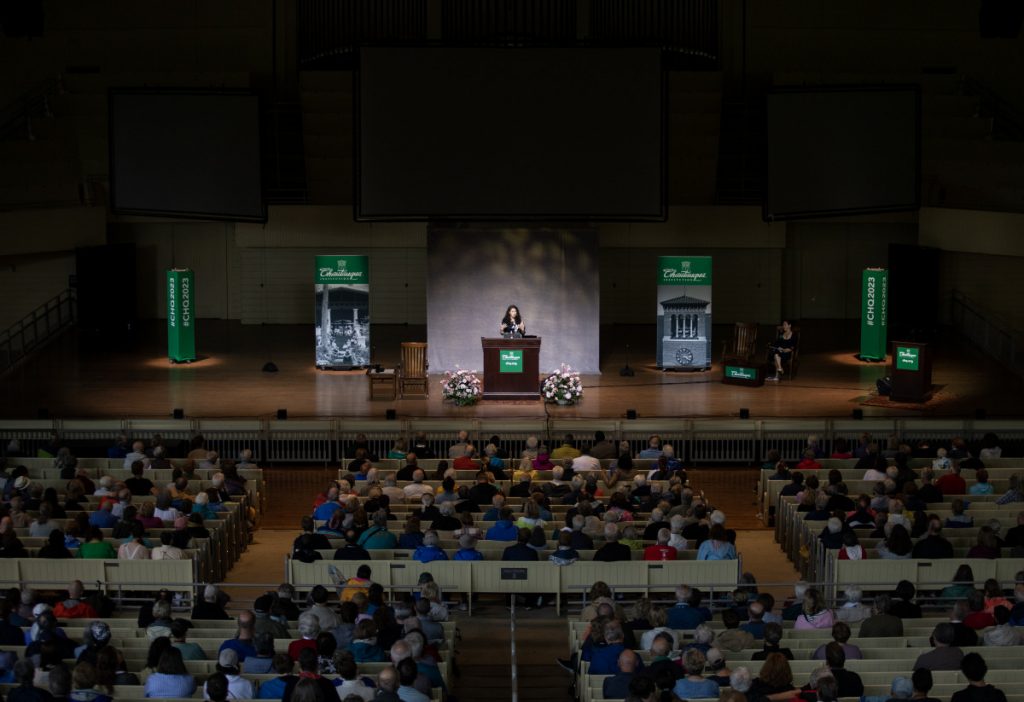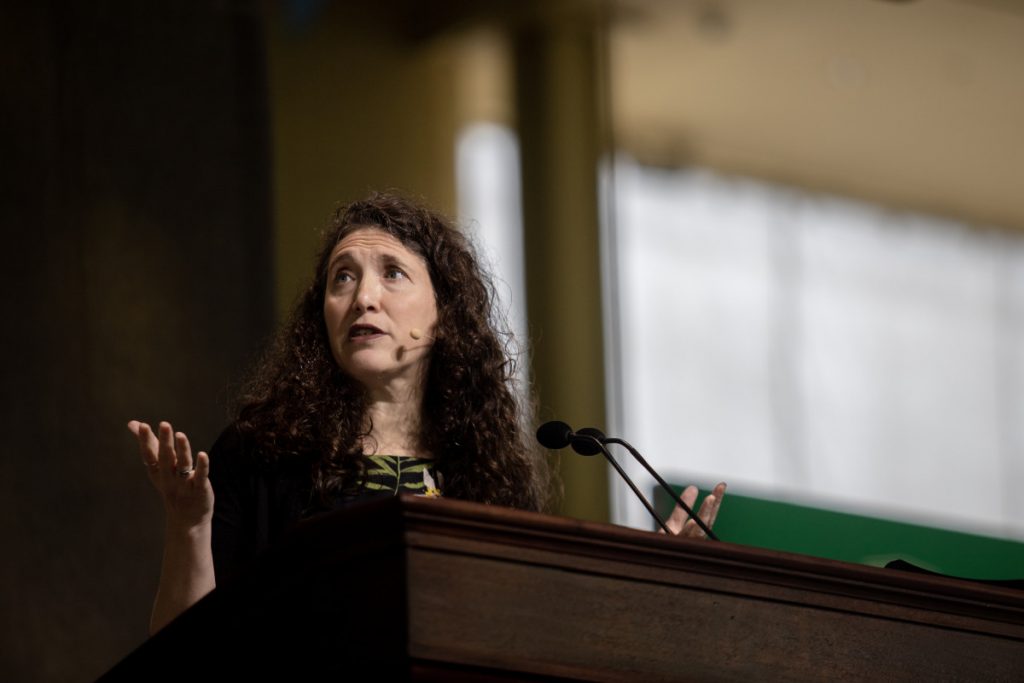
Alton Northup
Staff writer
During the pandemic, Pulitzer Prize-winning journalist Jennifer Senior did something most people can relate to – reevaluated her friendships.
The culmination of this examination was a cover story for The Atlantic that ignited a new perspective on friendship and its importance to our spirit, happiness and health, which she shared at 10:45 a.m. on Tuesday in the Amphitheater for the second installment of the Chautauqua Lecture Series Week One theme, “On Friendship.”
Senior’s original plan for her article, “It’s Your Friends Who Break Your Heart,” published in 2022, was to explore midlife friendship. Of course, it would be naive to do such a dive without undergoing a little introspection.
“What that meant, in turn, was to some degree – in fact to a rather painful degree – was looking at the friendships of mine that have either died or were on treacherously thin ice,” Senior said.
One of the friends she reflected on for her piece was central to forming her identity, yet grew distant after he became a father and said he had higher moral obligations than their friendship or her feelings. Senior was honest about the pain this caused her, and said while she now understands his perspective, “there was something so staggeringly hurtful about so crudely and so ruthlessly locating a person in the moral pecking order of your priorities.”
After publishing her article, she received a surprising response from the long-lost friend. Knowing he had egg on his face, he wanted to make things right; he had missed their friendship.
Senior said rebuilding their relationship was a “miraculous midlife gift,” but navigating the uncharted water of friendship was not easy. While researching her piece, she found scholarly articles on the matter to be few and far between.
“Friendship has sort of always been the red-headed step-child of the social sciences,” she said.
Most studies focused on childhood friendships, or were really “dopey self-help all gussied up in peer review drag.” There was practically nothing on middle-aged friendships.
When the social sciences consider relationships, it is usually the ones generated through strong bonds of blood, law and physical intimacy, Senior said. Yet, friendship is central to our lives, particularly when considering that nearly a quarter of American adults ages 30 to 49 are single.
As fertility rates continue to drop, older generations pass and social capital erodes through the loss of activity centers, meeting halls and worship communities, we lose access to cross-generational interaction and mentorship. With the loss of these vertical structures, we become reliant on looking horizontally toward our peers for cues. Friendship, Senior affirmed, is more important now than ever.
“Modern life conspires against friendship, while at the same time modern life is exactly what makes us need friendship the most,” she said.

The problem is there appears to be a correlation between the importance of friendship and the difficulty of maintaining them. Marriage, parenthood, politics, illness, success, failure, envy, death, divorce and geography are all all-too-common reasons for the dissolution of friendship.
“Most friendships don’t end operatically; they end in a very quiet, slow, gray dissolve. They simply fade,” Senior said. “But the ones with deliberate endings can really torment. At best, they ache and I think, at worst, they sort of feel like failures.”
She compared it to a “modest divorce” but without the counseling and mediation fitting for the deep wound inflicted by loss.
So, how do we save ourselves from the isolation and disappearance of friends? We must recommit to the friends we already have.
Senior laid out how to do this in six steps she called “The Rules of Friendship”:
Good friends stand up for each other
Good friends trust and confide in each other
Good friends support each other emotionally
Good friends offer help if it’s required
Good friends try to make each other happy
Good friends keep each other up to date on positive life developments
“It’s effortful, it’s premeditated,” she said. “This is not just a matter of making somebody happy over dinner; it’s thinking beforehand about what you can do.”
The benefits of friendships are bountiful. Spending time with a friend has the same effect on your health as quitting smoking, Senior said, and noted friendships were the highest valued relationships in antiquity.
“‘The person is giving back to you the feelings you wish you could give to yourself, and seeing the person you wish to be in the world,’” she said, quoting Ben Taylor.
Senior closed her lecture remembering common reactions to the passing of Nora Ephron, a beloved American journalist, writer and filmmaker.
“She told no one she was dying of cancer, so when everyone found out they were like, ‘Oh my god, had I known – had I only known – I would have spent more time with her. I would never have just blindly assumed that more dinners were ahead,’” she said. “But this is true for all of us; we are all one day not going to be here. How long, honestly, can we all keep postponing dinner?”
Editors’ note: While we mistakenly omitted Alton Northup’s staff bio in the first edition of the Daily, we are pleased to share it here:
Alton Northup is a rising junior at Kent State University majoring in journalism. This is his first summer at Chautauqua, and he is covering morning lectures. He recently covered the crisis and help beat for KentWired, where he previously worked as a general assignment reporter and senior reporter. A proud Erieite — a resident of Erie, Pennsylvania — he never misses an opportunity to share his city with others. He is excited to continue learning this summer while growing as a reporter.




